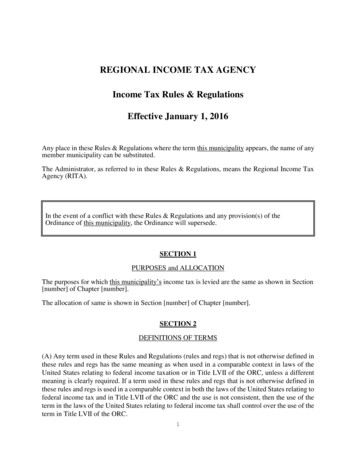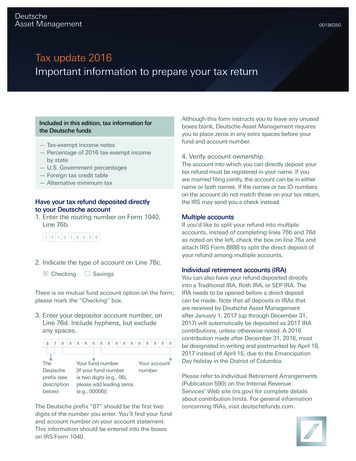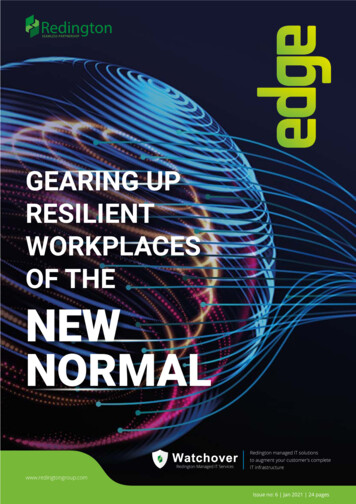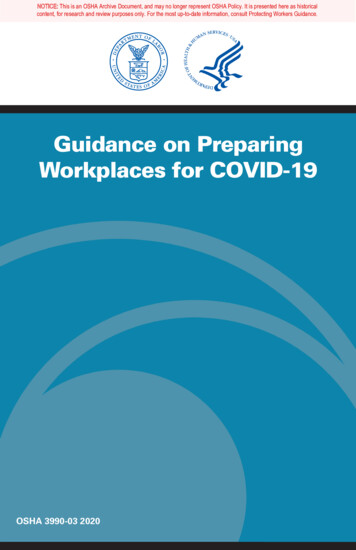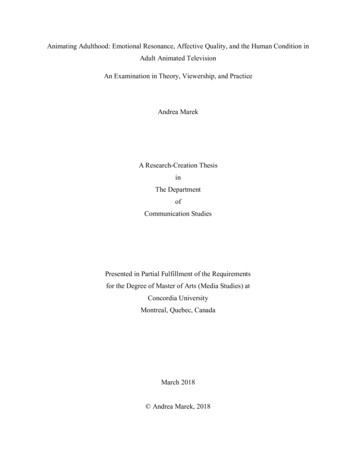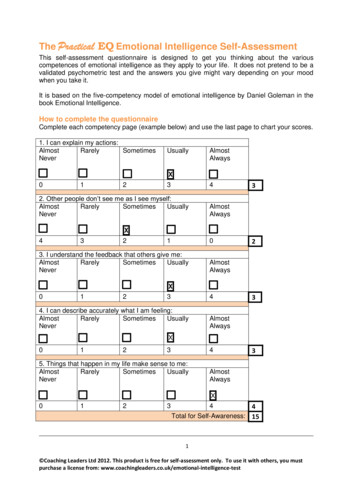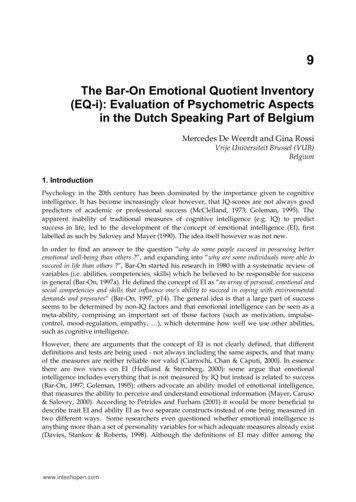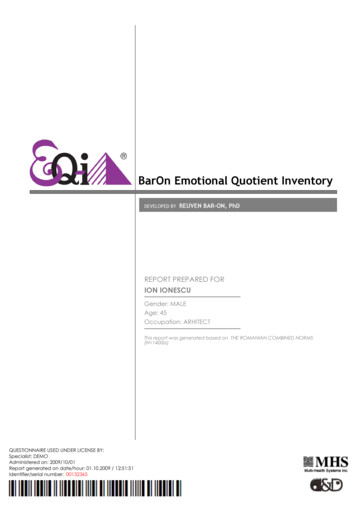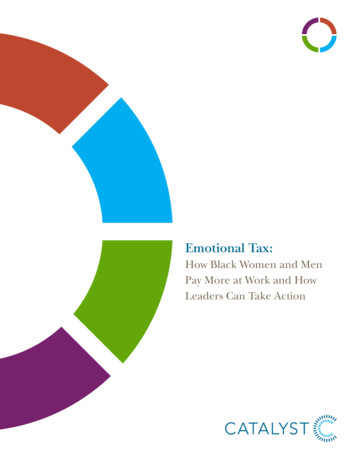
Transcription
Emotional Tax:How Black Women and MenPay More at Work and HowLeaders Can Take Action
About the Catalyst Research CentersThe Catalyst ResearchThe Catalyst ResearchThe Catalyst ResearchThe Catalyst Research CenterCenter for Equity in BusinessCenter for Career PathwaysCenter for Advancingfor Corporate PracticeLeadership examines andexposes root causes ofLeader Effectivenessconducts researchdocuments workforcegender gaps from theexplores a central challengedistinguishing sound talentdemographics and theirclassroom to the boardroom,facing today’s businessmanagement strategiesimpact on employees,conducting research thatleaders: how to leveragefrom programmatic fads andcompanies, communities,sorts myth from fact,employee diversity todocuments best practices.and society. In particular,identifies the true problemsachieve success throughThese findings enablethe Center identifies howthat hold women and otherinclusive decision-makingorganizations to strategicallywomen’s underrepresentationunderrepresented groupsand talent management.create and support inclusiveaffects corporate governanceback from advancement,The Center’s researchcultures for both women andand executive teams, andand provides a solid basisexamines the nature,men. The Center’s partnershipit explores how diversefor more effective talentimpact, and practice ofwith its Expert Community,leadership contributesdevelopment. The Center’sinclusive leadership. It helpsa consortium of businessto business success.findings allow businesses,committed leaders learnleaders who contribute toBy verifying gaps inmedia, governments, andhow to become individualand act on the Center’srepresentation and creatingindividuals to gauge women’schange agents, shapingwork, informs organizationalresults-oriented solutions,progress and developthe workplace culture bypolicy and practices, leadingthe Center’s findings andsolutions and action plansrole modeling effectiveto actionable solutions andrecommendations helpto advance women intointerpersonal interactions andsystemic change.organizations diversifyleadership.capitalizing on opportunitiesto build inclusive talentleadership.management systems.GENDER, RACE,AND ETHNICITY INTHE WORKPLACECatalyst’s Gender, Race, and Ethnicity Research Initiative createsknowledge and actionable insights that recognize current realities anddeep-rooted inequities and help leaders and organizations nurtureinclusive organizations where all can thrive and succeed.About CatalystFounded in 1962, Catalyst is the leading nonprofit organization accelerating progress for women throughworkplace inclusion. With operations in the United States, Canada, Europe, India, Australia, and Japan,and more than 800 supporting organizations, Catalyst is the trusted resource for research, information, andadvice about women at work. Catalyst annually honors exemplary organizational initiatives that promotewomen’s advancement with the Catalyst Award.
Emotional Tax:How Black Women and Men Pay More at Work andHow Leaders Can Take ActionDnika J. Travis, PhDJennifer Thorpe-Moscon, PhDCourtney McCluneyResearch Partners:Abercrombie & FitchAT&T Inc.Bank of AmericaBloombergBMO Financial GroupThe Boston Consulting GroupChevron CorporationCredit SuisseDebevoise & Plimpton LLPDell Inc.Deutsche Bank AGEYHalliburtonHewlett-Packard CompanyIBM CorporationKeyBankKimberly-Clark CorporationMcDonald’s CorporationNovo NordiskPAREXELSodexoState Street CorporationUPSVerizonThe findings, views, and recommendations expressed in Catalyst reports are not preparedby, are not the responsibility of, and do not necessarily reflect the views of the fundingorganizations.Unauthorized reproduction of this publication or any part thereof is prohibited.catalyst.orgThis work is licensed under a Creative Commons Attribution-NonCommercial 4.0 International License.
Emotional Tax May Impair Black Women’sand Men’s Health and SuccessBlack women and men have high aspirationsto be successful at work, and outworking andoutperforming others is the norm for many.1 Butwhat happens to the minds, bodies, and spirits ofBlack employees when unrealistic expectations aretoo much to bear—if, despite their hard work, theyremain set apart and undervalued?In this study of Black women and men employees,we found evidence of an “Emotional Tax” thatis levied on Black women and men as they try tosuccessfully navigate through their careers.2Emotional Tax is the heightened experienceof being different from peers at work becauseof your gender and/or race/ethnicity and theassociated detrimental effects on health, wellbeing, and the ability to thrive at work.Specifically, our data show that the Emotional Taxcan deplete Black employees’ sense of well-beingby making them feel that they have to be “onguard,” disrupting sleep patterns, reducing theirsense of “psychological safety,”3 and diminishingtheir ability to contribute at work.In addition to the quantitative data that supportthese findings, comments made by study respondentsabout their experiences at work depict various aspectsof the Emotional Tax and its impact on their abilityto thrive and succeed at work. Their observationsillustrate the costs of feeling different at work basedon gender and/or race/ethnicity—and the resultingdecisions some participants have made, to acceptthings as “just the way they are” and “suck it up.”“I’m treated as an equal until something negativeabout my race is in the news or [a] conversation.Then I feel the different treatment.”—Black man, 47, middle manager,for-profit, construction2 Emotional Tax“I love my job, but I have been told mysuperiors won’t promote me based on myphysical appearance. I wish I had it on tapeor they would say it directly to me. So manypeople still act like school children spreadingtheir lies and rumors. It is quite horrible.”—Black woman, 27,non-management, telecommunications“I work in a gas station as the regionalmanager The men get paid way more than[the women] but I stop complaining sinceeverything has been done already.”—Black woman, 47,first-level manager, utility services“I enjoy [work] sometimes, and other timesI feel like my skin color affects how I amtreated. It depends on who I am around. I tryto stay close to certain people and feel someanxious feelings around certain groups ofwhite workers.”—Black man, 30, first-level manager,for-profit, industrial manufacturingDespite this reality, inclusive work environmentscan offer relief from the Emotional Tax. All of ushave a role to play in creating workplaces whereeveryone is valued, heard, and has fair opportunitiesto succeed.
Black Women and Black Men Want Similar ThingsOut of Life: Influence, Power, and Purpose“The Black experience in the professionalworkplace has not changed much at all overthe years. It has simply taken on another faceand attempted to hide itself even betterbehind shady policies and unique situationsthat ultimately discriminate against thesocioeconomically disadvantaged worker ofcolor . But you deal with it and move on.What am I supposed to do every time I meeta ‘hidden’ bigot or twisted company policythat has it in for me? Roll over and die? No, Idon’t think so. I have a family to support anda destiny and purpose in life to achieve .Soon with the show.”—Black man, 25,first-level manager, for-profit, retailDespite feeling excluded at work, Black womenand men have similar career goals.4Black women and men want to:ENGAGE INCHALLENGING ANDINTELLECTUALLYSTIMULATING WORK89%89%88%87%87%85%81%82%womenREMAIN IN THESAME COMPANYwomenBE AN INFLUENTIALLEADERwomenOBTAIN A HIGHRANKING POSITIONwomenmenmenmenmenBlack women and men agree that obtainingfinancial stability, being a good parent, givingback to others, and taking care of relatives (e.g.,parents, aunts, uncles, brothers, sisters) areimportant. Although there are slight differences insome categories between women and men, bothgenders have high aspirations in all of them:ABOUT THE STUDYFindings from this study were shared by Catalystexclusively with ESSENCE Magazine, which featuredit in “Battling the Burden of Success,” an article inthe November 2016 issue.The study includes a sample of 649 Blackemployees, 322 women and 327 men, including19.1% non-management/individual contributors,23.3% first-level managers, 28.3% middlemanagers, 18.2% senior executives, and 11%CEOs/business owners. Top industries representedare retail, healthcare, financial services, education,construction, and information services/IT.Black women and men value:596%88%94%89%91%86%91%90%OBTAINING FINANCIALSTABILITYwomenBEING A GOODPARENTwomenGIVING BACKTO OTHERSwomenTAKING CARE OFRELATIVES(E.G., PARENTS,AUNTS, UNCLES,womenmenmenmenmenBROTHERS, SISTERS)How Black Women and Men Pay More at Work and How Leaders Can Take Action 3
Emotional Tax Linked to Sleep Problems and a Stateof Being “On Guard”Black women and men are aiming high, but theEmotional Tax they must bear can get in the wayof their success. It is suffered by Black women andmen in a few different ways.6 45% of those who felt different basedon gender and race/ethnicity had sleepproblems compared to 25% of those whodid not feel different on either.7 54% of those who felt different based ongender and race/ethnicity felt that theyhad to be “on guard” (i.e., consciouslypreparing to deal with potentialdiscrimination by bracing for insults,avoiding social situations and places, ortaking care with appearance to avoid bias)compared to 34% of those who did notfeel different on either.8Relief From Emotional Tax Can Enhance BlackWomen’s and Men’s Ability to Contribute at WorkBlack women and men who did not feel differentbased on either their gender or their race/ethnicity9 were able to contribute more at work. 74% of those who did not feel differentspoke up about important or difficultissues at work, compared to 56% of thosewho felt different based on either gender,race/ethnicity, or both.104 Emotional Tax 75% of those who did not feel differentreported being creative and innovative atwork, compared to 61% of those who feltdifferent based on either gender, race/ethnicity, or both.11
Relief From the Emotional Tax Is Associated WithMore Psychological Safety at WorkWhen you feel that organizational leaders andteam members “have your back,” you are morelikely to feel safe taking interpersonal risks.12 Thisform of psychological safety creates space for youto speak up about difficult issues, feel confidentmistakes won’t be held against you, and trust thatco-workers won’t undermine your efforts.13Black employees who don’t feel different fromtheir colleagues are more likely to feel safe bringingtheir unique voices to work—to have experiencesthat may lessen the burden of Emotional Tax. 54% of those who didn’t feel differenton either gender or race/ethnicity feltpsychologically safe, compared to 34% ofthose who felt different on either gender,race/ethnicity, or both.14Inclusive Workplaces Could Help Alleviate theEmotional TaxFeeling included at work has profound benefitsthat can alleviate the burden of the Emotional Tax.You experience inclusion when you simultaneouslyfeel valued for your uniqueness and you have asense of belonging on your team.15Findings show that inclusion is associated withreduced feelings of difference16 for both Blackwomen and men. Among those who felt included, only 27%felt different based on gender and only39% felt different based on race/ethnicity.A key component of an inclusive culture iscreating a sense of psychological safety whereemployees feel comfortable taking risks. For Blackemployees, this feeling of safety may help createthe sense of inclusion needed to alleviate theEmotional Tax. A closer look at findings shows that: Among those who didpsychologically safe, onlyincluded.not feel21% felt But among those who did feelpsychologically safe, 86% felt included.17 Among those who did not feel included,49% felt different based on gender and62% felt different based on race/ethnicity.How Black Women and Men Pay More at Work and How Leaders Can Take Action 5
Leaders at All Levels Can Take ActionLeaders—whether working in the C-suite, on thefront-lines, as entrepreneurs, managers, or in juniorpositions—all have a role to play in mitigating theEmotional Tax and its effects on the careers of Blackwomen and men. Leaders must take action to makeeveryone feel included, and not excluded becauseof gender or race/ethnicity. In this way, everyonecan thrive at work and contribute their best.Start with the following actions Support and role model flexiblework arrangementsFindings show that Black women and men regardtaking care of family members, being challengedand advancing at work, and doing good for theirbroader communities are important. For all ofthese positive things to happen, employers mustmake flexible working arrangements (FWAs) acore part of their offerings. In flexible workingenvironments, leaders recognize that what mattersis the quality of an employee’s work—not whenor where that work gets done. Employees canbe at their most productive and innovative, andthey can integrate their work and personal lives inthe way that works best for them, relieving stressand reducing conflicts. Prior Catalyst researchhas shown that everyone wants FWAs, includingwomen and men, parents and non-parents, CEOsand entry-level workers.18 By supporting employeewell-being, employers can alleviate a critical part ofthe Emotional Tax. Have an honest conversationStart by inviting your colleagues to shareexamples of two distinct experiences: a time whenthey were in a group (e.g., a work team) in whichpeople felt valued, heard, and included; and thena time when they felt singled out, devalued, ordismissed.19 Seek to learn from the perspectives ofthose who have different racial, ethnic, or culturalbackgrounds than yours. Be open and willing to6 Emotional Taxshare your own experiences and viewpoints.20These conversations can create understandingamong people from different backgrounds andhelp to find common ground. Focus on building trustFor honest conversations to work, participants mustbe willing to discuss difficult topics and sometimesexperience a little discomfort. Foster trust by usingstrategies such as asking a colleague: “Can I count onyour help to give me honest, constructive feedback ifI use words that are hurtful or offensive to you, in themoment or later?” Open the door to conversationsin which each person assumes positive intent of theothers and engages in thoughtful listening, not justwaiting for the next chance to speak. Your coworkerswill develop trust that you will deeply listen to andconsider their perspectives.21 Speak up against exclusionary behaviorIf you see exclusionary behavior in your workplace,say something (in the moment, or later). It may bethat the person exhibiting the behavior does notrealize he or she is being exclusionary—unconsciousbias can affect even the best-intentioned people.Silence in the face of harmful behavior makes uscomplicit in it. Be the person whose action makesworkplaces safe and inclusive for everyone.22 Be inclusive every day23Certainly, making inclusion a reality for womenand people of color takes time. However, Catalystresearch shows that the day-to-day experiences ofemployees matter.24 If we are all willing to step up,we can create inclusive cultures where employeescan take risks, make mistakes, and bring their best(and most authentic) selves and talents to work. Inthis type of environment, all employees can thrive,and nobody has to pay an Emotional Tax.
Endnotes1. Gillian B. White, “Black Workers Really Do Need to BeTwice as Good,” The Atlantic, October 7, 2015.2. “Emotional Tax,” as described in this research, is oneaspect of the cultural experiences shared by people acrossintersections of gender, race, and ethnicity. Notably, “BlackTax,” or the feeling that you have to work twice as hardto keep up with your White peers, is one way that Blackemployees feel set apart or different at work. Our researchbuilds on this idea work related to it, by acknowledgingthe heightened experiences of being different from peersat work because of your gender and/or race/ethnicityand the associated detrimental effects on health, wellbeing, and the ability to thrive at work. Joanna N. Ravello,“Intersectionality at Work: Black Women Administrators’Perceptions of Their Work Performance at PredominatelyWhite Institutions,” (PhD Dissertation, University ofMassachusetts Boston, May 2016): p. 172.3. Jeanine Prime and Elizabeth R. Salib, The Secret toInclusion in Australian Workplaces: Psychological Safety(Catalyst, 2015).4. None of these comparisons are significant at the p .05level.5. Participants were asked to what extent each of these goalswas important to them on a scale of ‘1’ (not at all important)to ‘4’ (very important). T-tests were conducted to determineif there were differences on these scores between womenand men. The difference for taking care of relatives was notsignificant at the p .05 level. The differences for obtainingfinancial stability, being a good parent, and giving back toothers were significant at the p .05 level. Percentagesreported reflect the proportion who indicated that thegoals were “somewhat” or “very” important.6. Among those who felt different on both gender and race/ethnicity, 49% were women and 51% were men.7. A regression was conducted, adjusting for ethnic centralityand reported gender, of sleep quality on a compositevariable coded ‘0’ if participants felt different on neithergender nor race/ethnicity and ‘1’ if they felt different onboth. The composite variable significantly predicted worsesleep problems such that feeling different on both predictedmore sleep problems than feeling different on neither, p .05. Percentages reflect the proportion of people reportingtrouble falling asleep, waking up in the middle of the night,and waking up early more than sometimes.8. A regression was conducted, adjusting for ethnic centralityand reported gender, of vigilance on a composite variablecoded ‘0’ if participants felt different on neither gendernor race/ethnicity and ‘1’ if they felt different on both. Thecomposite variable significantly predicted more frequentvigilance behaviors such that feeling different on bothpredicted more such behaviors than feeling differenton neither, p .05. Percentages reflect the proportionof people who report trying to prepare for insults, beingcareful about their appearance, and avoiding certain socialsituations and places more than sometimes.9. Among those who did not feel different on gender or race/ethnicity, 57% were women and 43% were men.10. A regression was conducted, adjusting for ethnic centralityand reported gender, of speaking up on a compositevariable coded ‘0’ if participants felt different on eithergender or race/ethnicity, or if they felt different on both,and ‘1’ if they felt different on neither. The compositevariable significantly predicted more frequent speaking upbehaviors such that feeling different on neither predictedmore such behaviors than feeling different on both oreither, p .05. Percentages reflect the proportion ofpeople who agree that they perform a variety of speakingup behaviors.11. A regression was conducted, adjusting for ethnic centralityand reported gender, of innovation on a composite variablecoded ‘0’ if participants felt different on either genderor race/ethnicity, or if they felt different on both, and ‘1’if they felt different on neither. The composite variablesignificantly predicted more innovation such that feelingdifferent on neither predicted more creativity than feelingdifferent on both or either, p .05. Percentages reflect theproportion of people who agree that they perform a varietyof innovative behaviors.12. Prime and Salib, The Secret to Inclusion.13. Amy Edmondson, “Psychological Safety and LearningBehavior in Work Teams,” Administrative SciencesQuarterly, vol. 44 (1999): p. 350-383.14. A regression was conducted, adjusting for ethnic centralityand reported gender, of psychological safety on a compositevariable coded ‘0’ if participants felt different on eithergender or race/ethnicity, or if they felt different on both, and‘1’ if they felt different on neither. The composite variablesignificantly predicted more psychological safety such thatfeeling different on neither predicted more such safety thanfeeling different on both or either, p .05. Percentagesreflect the proportion of people who report ‘often’ or‘always’ feeling psychologically safe on their team.15. Jeanine Prime and Elizabeth R. Salib, Inclusive Leadership:The View From Six Countries (Catalyst, 2014).16. Both types of feeling different were regressed on inclusion.Inclusion was a significant predictor of feeling less differenton both gender and race/ethnicity for both women andmen, ps .05.17. Inclusion was regressed on psychological safety for bothwomen and men. Psychological safety was a significantpredictor of inclusion for both genders, ps .05.18. Catalyst, Flex Works (2013).19. Julie S. Nugent, Alixandra Pollack, and Dnika J. Travis, TheDay-to-Day Experiences of Workplace Inclusion andExclusion (Catalyst, 2016).20. Catalyst, Engaging in Conversations About Gender, Race,and Ethnicity in the Workplace (2016).21. Catalyst, Engaging in Conversations About Gender, Race,and Ethnicity in the Workplace (2016); Katherine Giscombe,Marissa Agin, and Vrinda Deva, Building Trust BetweenManagers and Diverse Women Direct Reports (Catalyst,2011).22. Catalyst, Engaging in Conversations About Gender, Race,and Ethnicity in the Workplace (2016).23. Catalyst, Be Inclusive Every Day (2016).24. Nugent, Pollack, and Travis.How Black Women and Men Pay More at Work and How Leaders Can Take Action 7
AcknowledgmentsThis report is the result of the teamwork andcollaboration of many individuals. Dnika J. Travis,PhD, Vice President, Women of Color Research& Center Leader, Catalyst Research Center forCorporate Practice; Jennifer Thorpe-Moscon, PhD,Director & Panel Manager, Research, Catalyst; andCourtney McCluney, Research Fellow, Womenof Color Research, Catalyst, conceptualizedthe research, led the survey creation and datacollection, conducted the data analyses, and coauthored the report.We wish to extend our thanks to the manyCatalyst experts and colleagues who contributedto this research and the production of this report.Specifically, a special thanks goes to Jeanine Prime,PhD, Senior Vice President, Research, Catalyst, whoprovided invaluable feedback in the developmentof this report and its drafts.We also wish to thank Tia Gordon, VicePresident, Global Communications, Catalyst, forher important feedback and help in positioningthis report; and Afiya Lahens-Wallace, Analyst,8 Emotional TaxGlobal Member Services & Research, Catalyst, forher feedback on prior versions of this report andher contributions to Catalyst’s Gender, Race, andEthnicity research initiative.We are grateful to General Motors Foundation forits generous Catalyst 2016 Women of Color ResearchPanel grant that allowed us to build our panel ofresearch participants, and to Catalyst’s ResearchPartners whose contributions enable this work. Weare furthermore deeply thankful for the participationof the Research Collective, our community of peoplewho provided their experiences in our survey,allowing us to generate the insights in this reportthat promote workplace inclusion.Finally, we extend our gratitude to ESSENCEMagazine and, in particular, Lauren Williams,Features Editor, ESSENCE; and Vanessa DeLuca,Editor-in-Chief, ESSENCE, for so powerfullyleveraging our findings to tell the story of theEmotional Tax Black women and men face and howit might be lessened.
Board of DirectorsChairPeter VoserChairmanABB Ltd.SecretaryMaggie WilderotterRetired Chairman & CEOFrontier CommunicationsCorporationTreasurerThomas J. FalkChairman & CEOKimberly-Clark CorporationLinda AddisonManaging PartnerNorton Rose Fulbright LLPJohn BryantChairman, President & CEOKellogg CompanyUrsula M. BurnsChairman & CEOXerox CorporationMarillyn A. HewsonChairman, President & CEOLockheed Martin CorporationJacqueline HinmanChairman & CEOCH2M HILL Companies Ltd.Mary Beth Hogan, Esq.Co-Chair, LitigationDepartmentDebevoise & Plimpton LLPMuhtar KentChairman & CEOThe Coca-Cola CompanyChanda KochharManaging Director & CEOICICI Bank Ltd.Michel LandelGroup CEOSodexoMarc B. LautenbachPresident & CEOPitney Bowes Inc.Ian CookChairman, President & CEOColgate-Palmolive CompanyGerald LemaChairman & ManagingPartnerCylon CapitalBrian CornellChairman & CEOTarget CorporationSheri S. McCoyChief Executive OfficerAvon Products, Inc.Mary B. Cranston, Esq.Retired Senior PartnerPillsbury WinthropShaw Pittman LLPBeth E. MooneyChairman & CEOKeyCorpMichael S. DellChairman & CEODell Inc.Jamie DimonChairman & CEOJPMorgan Chase & Co.William A. DowneChief Executive OfficerBMO Financial GroupSteve EasterbrookPresident & CEOMcDonald’s CorporationCathy EngelbertChief Executive OfficerDeloitte LLPEric J. FossPresident & CEOAramarkDeborah GillisPresident & CEOCatalystDenise MorrisonPresident & CEOCampbell Soup CompanyIndra K. NooyiChairman & CEOPepsiCo, Inc.Stephen S. RasmussenChief Executive OfficerNationwideChristopher J. SwiftChairman & CEOThe Hartford FinancialServices Group, Inc.John F. Smith, Jr.Chairman & CEOGeneral Motors Corporation1998 – 2001David S. TaylorChairman, President & CEOThe Procter & GambleCompanyThomas J. EngibousChairman, President & CEOTexas Instruments Incorporated2002 – 2005Richard K. TempletonChairman, President & CEOTexas InstrumentsIncorporatedCharles O. Holliday, Jr.Chairman & CEODuPont2006 – 2008John B. VeihmeyerGlobal ChairmanKPMGJames S. TurleyChairman & CEOErnst & Young2009 – 2013Mark WeinbergerChairman & CEOEYHistoric List ofBoard ChairsThomas C. MendenhallPresidentSmith College1962 – 1976Donald V. SeibertChairman of the BoardJ.C. Penney Company, Inc.1977 – 1980Lewis H. YoungEditor-in-ChiefBusiness Week1981 – 1984Charles W. ParryChairman & CEOAluminum Companyof America1985 – 1986Richard E. HeckertChairman & CEOE.I. du Pont de Nemours& Company1987 – 1988Ian C. ReadChairman & CEOPfizer IncReuben MarkChairman & CEOColgate-Palmolive Company1989 – 1990Feike SijbesmaCEO & ChairmanManaging BoardRoyal DSMJohn H. BryanChairman & CEOSara Lee Corporation1991 – 1995Julie SweetGroup Chief Executive- North AmericaAccentureJ. Michael CookChairman & CEODeloitte & Touche LLP1996 – 1997Honorary DirectorsTony ComperRetired President & CEOBMO Financial GroupMichael J. CritelliRetired Chairman & CEOPitney Bowes Inc.Thomas J. EngibousRetired Chairman & CEOTexas Instruments IncorporatedAnn M. FudgeRetired Chairman & CEOYoung & Rubicam BrandsCharles O. Holliday, Jr.Retired Chairman & CEODuPontKaren KatenRetired Vice ChairmanPfizer IncIlene H. LangRetired President & CEOCatalystReuben MarkRetired Chairman & CEOColgate-Palmolive CompanyAnne M. MulcahyRetired Chairman & CEOXerox CorporationBarbara Paul Robinson, Esq.Retired PartnerDebevoise & Plimpton LLPJames S. TurleyRetired Chairman & CEOErnst & YoungG. Richard Wagoner, Jr.Retired Chairman & CEOGeneral Motors Corporation
CATALYST120 Wall Street, 15th FloorNew York, NY 10005T 1 212 514 7600CATALYST CANADA8 King Street East, Suite 505Toronto, Ontario M5C 1B5T 1 416 815 7600CATALYST EUROPEc/o KPMG AGLandis Gyr-Strasse 16300 Zug, SwitzerlandT 41 (0)44 208 3152CATALYST INDIA WRC106 “B”, Damji Shamji Corporate SquareMelville EstateOff Ghatkopar-Andheri Link RoadPant Nagar, Ghatkopar EastMumbai 400 075IndiaT 91 22 6700 0785CATALYST AUSTRALIAc/o Hayes Knight (Melbourne) Pty LtdLevel 1231 Queen StreetMelbourne, Victoria 3000T 61 (0)3 8844 5600CATALYST JAPAN5F Azabu Green Terrace3-20-1 Minami Azabu, Minato-kuTokyo, Japan 106-0047T 81 (0)3 6859 8510catalyst.org
Black women and men have high aspirations to be successful at work, and outworking and outperforming others is the norm for many.1 But what happens to the minds, bodies, and spirits of Black employees when unrealistic expectations are too much to bear—if, despit

